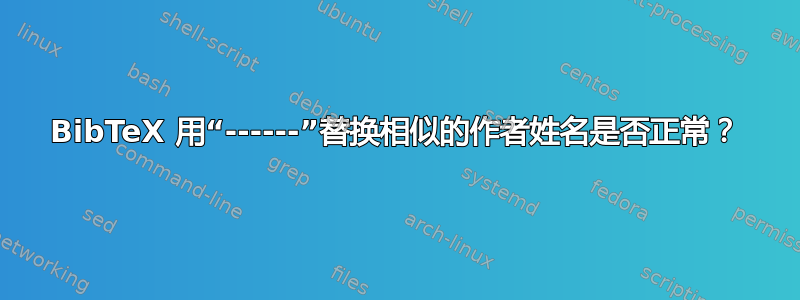
在我的.bib文件中,有两个条目具有完全相同的作者姓名:
@article{Seshadrinathan2010A-Subjective-St,
Author = {K. Seshadrinathan and R. Soundararajan and A. C. Bovik and L. K. Cormack},
....
@article{Seshadrinathan2009Study-of-Subjec,
Author = {K. Seshadrinathan and R. Soundararajan and A. C. Bovik and L. K. Cormack},
....
当互相引用,并按照IEEEtran参考书目样式排版时,.bbl文件内容如下:
\bibitem{Seshadrinathan2010A-Subjective-St}
K.~Seshadrinathan, R.~Soundararajan, A.~C. Bovik, and L.~K. Cormack, ``A
subjective study to evaluate video quality assessment algorithms,''
\emph{SPIE Proceedings Human Vision and Electronic Imaging}, 2010.
\bibitem{Seshadrinathan2009Study-of-Subjec}
------, ``Study of subjective and objective quality assessment of video,''
\emph{IEEE Transactions on Image Processing}, 2009.
如您所见,作者姓名已被替换------。最终的 PDF 如下所示:

这是正常行为吗?
答案1
提到的行为是默认的使用IEEEtran.bst样式。要更改它,您可以IEEEtranBSTCTL在 bib 数据库中定义一个条目并更改 的默认值CTLdash_repeated_names。因此,在这种情况下,您的条目应如下所示:
@IEEEtranBSTCTL{IEEEexample:BSTcontrol,
CTLdash_repeated_names = "no"
}
然后在文件主体中,.tex你必须使用以下命令激活更改
\bstctlcite{IEEEexample:BSTcontrol}
示例(感谢 Marco):
\RequirePackage{filecontents}
\begin{filecontents}{\jobname.bib}
@IEEEtranBSTCTL{IEEEexample:BSTcontrol,
CTLdash_repeated_names= "no",
}
@article{Seshadrinathan2010A-Subjective-St,
Author = {K. Seshadrinathan and R. Soundararajan and A. C. Bovik and L. K. Cormack},
title={foo},
year={2011},
journal={bla}
}
@article{Seshadrinathan2009Study-of-Subjec,
Author = {K. Seshadrinathan and R. Soundararajan and A. C. Bovik and L. K. Cormack},
title={bar},
year={2010},
journal={bla}
}
\end{filecontents}
\documentclass{IEEEtran}
%\usepackage{IEEEtrantools}% only needed if a class different from IEEEtran is used.
\begin{document}
\bstctlcite{IEEEexample:BSTcontrol}
\cite{Seshadrinathan2010A-Subjective-St}
\cite{Seshadrinathan2009Study-of-Subjec}
\bibliographystyle{IEEEtran}
\bibliography{\jobname}
\end{document}

答案2
要删除破折号,请将IEEEtran.bst位于/bibtex/bst/IEEEtranTeX 发行版中的文件复制到工作目录,并将其重命名为myIEEEtran.bst。在重命名的副本中,替换
FUNCTION {default.is.dash.repeated.names} { #1 }
和
FUNCTION {default.is.dash.repeated.names} { #0 }
并使用 编译您的.tex文档\bibliographystyle{myieeetran}。
编辑:对于投反对票的人:原始(注释)代码IEEEtran.bst如下
% #0 turns off the "dashification" of repeated (i.e., identical to those
% of the previous entry) names. IEEE normally does this.
% #1 enables
FUNCTION {default.is.dash.repeated.names} { #1 }
因此我认为风格设计师将改变#1视为#0一种有效的定制方法。
答案3
这取决于参考书目样式。对于 样式 来说,这种行为是正常的IEEEtrans。
页面上展示了一些书目样式BibTeX 样式示例。
在这一点上,我推荐biblatex您可以通过选项设置此行为dashed。正如回答的那样在这篇文章中。
该包本身不提供IEEEtran样式,但有一个贡献:biblatex-ieee。
答案4
重复@MarcoDaniel,“这取决于参考书目风格。这种行为对于风格来说是正常的IEEEtrans.”
如果你正在写一篇要求的论文IEEEtrans(尤其是如果这篇论文要发表在 IEEE 上),我会认真考虑简单地使用默认行为作为你的论文的结果。这不是一个需要编程解决的“侥幸”,这是确切地该风格是如何被编程并设计来执行的。
您应该始终根据对您的写作具有权威性的风格指南(老师的选择、大学风格指南、公司风格指南、芝加哥、APA、MLA、AP 等)而不是您的个人喜好来撰写论文和选择引用风格。


